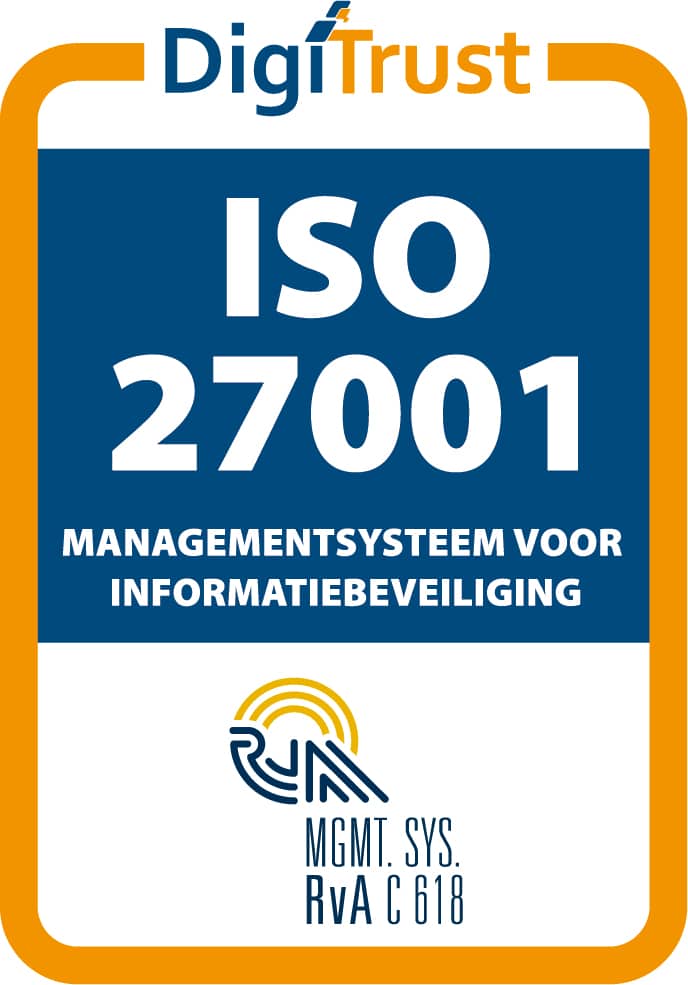Legal validity
Digital signatures are legally valid. The ordinary digital signature is not
In the Netherlands, a document with a digital signature has the same legal validity by law as a document with a wet written signature, provided certain conditions are met.
The law says that a digital signature has the same legal validity as a handwritten signature, if the method of authentication used in doing so is sufficiently reliable. Agreements on this have also been made in Europe. These are laid down in the European Regulation (EU) No. 910/2014, also known as eIDAS (Electronic identification and trust services), which has also applied to public services since Sept. 29, 2018.
Legal validity of ordinary digital signatures
Legally valid means that something is in force according to the law. A verbal agreement between a principal and a contractor is also, in principle, legally valid. From a legal point of view, such an agreement comes into being through a specific offer and the acceptance of that offer. In principle, therefore, an oral agreement is also legally valid. The legal validity of an agreement implies that the agreement can also be enforced. In the case of an oral agreement, this is problematic. It is difficult to prove exactly what the offer was and that the offer was actually accepted.
With ordinary digital signatures, a similar thing happens. When signing with an ordinary digital signature, it is not certain that the person who signed is also the person who should have signed. Also the contents of the agreement can be changed afterwards. An ordinary digital signature does not comply with Article 3:15 BW, paragraph 2 of the Civil Code in the Netherlands and enforcing the law becomes very difficult. It is therefore better to use an advanced digital signature or a qualified digital signature. Both are legally valid and compliance with the agreements made can be enforced, if necessary through the judiciary. The counterpart of Article 3:15 BW for the public sector is Article 2:16 Algemene wet bestuursrecht.
Legal validity of scanned document
Many organizations keep signed documents digitally. This involves first putting everything on paper and then scanning it in. However, these digital documents are viewed differently by the courts. This is because the problem with these scanned documents is that they can be falsified quite easily. That is why a scanned document is not assigned any binding evidential value, so the judge does not immediately assume that what is in the scanned digital document is correct and legally valid.
A scanned digital document has what is known as free evidence. This means that the court determines on a case-by-case basis whether this digital document is considered legally valid. So you are taking quite a risk replacing all paper versions of contracts with scanned copies. Scanning is not a problem, but always keep the original paper documents. That way you can be sure that your contracts and agreements in writing remain legally valid. With a digital signature you do not need to keep paper copies, these agreements have a high probative value of will.
Sign legally with Zynyo
Zynyo levert alle diensten voor geavanceerde en gekwalificeerde digitale handtekeningen. Beide zijn 100% betrouwbaar en hebben dezelfde rechtsgeldigheid als een nat geschreven handtekening. Mede omdat de methodes die Zynyo hanteert voor authenticatie van de ondertekenaars, voldoende betrouwbaar zijn en de identiteit van de ondertekenaars gewaarborgd is.
European eIDAS Regulation
Since 23 July 2014, the European Regulation (EU) No 910/2014 has existed, which among other things concerns the application of the digital signature. This regulation, is better known as eIDAS or Electronic identification and trust services. The Dutch law was changed on the basis of this regulation on 1 July 2016. eIDAS ensures that the same legislation applies to electronic signatures in all EU countries.
European eIDAS Regulation
Since 23 July 2014, the European Regulation (EU) No 910/2014 has existed, which among other things concerns the application of the digital signature. This regulation, is better known as eIDAS or Electronic identification and trust services. The Dutch law was changed on the basis of this regulation on 1 July 2016. eIDAS ensures that the same legislation applies to electronic signatures in all EU countries.
Watch out! EU PKI certificate mandatory!
According to eIDAS, qualified and advanced electronic signatures should use PKI certificates issued in the European Union. Pay attention to this when choosing your signing service provider.
Technical requirements
In addition to the legal frameworks surrounding the digital signature, which are established at European and national level, a technical standard has also been determined for digital signatures. These are also laid down in eIDAS. For the signing of documents, mainly PDF-documents are used. For the signing of PDF there is the PAdES standard developed by ETSI. Besides PAdES, also the XAdES (for XML) and CAdES (for codesigning) standards have been developed for signing. Zynyo meets all technical requirements for legally valid electronic signing.
Do you also want to sign electronically in a legally valid and reliable way?
Then make a no-obligation appointment with us.
